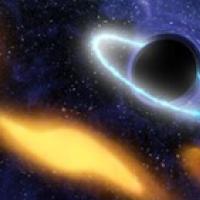
Mysterious black holes
Image courtesy NASA Jet Propulsion Laboratory.
It's hard not to be fascinated by black holes. They gobble up everything that gets too close to them, they can slow down time, and if you fall into one you'll probably get "spaghettified". Physicists believe that a black hole resides at the centre of most galaxies, and that tiny little ones might be produced for split seconds in particle accelerators like the LHC.
So, what exactly are black holes, how were they discovered, and what would it feel like to fall into one? To help answer these questions we have collated all our articles, videos and podcast about black holes on this one page. Enjoy the experience!
Black holes exist! — This short news story reports on the announcement made in February 2016 that physicists have finally found direct evidence for the existence of black holes.
What is a black hole — physically? — Small, dark, and very hard to see. This article provides answers to every question you ever wanted to ask about black holes. It contains a video featuring physicist Pau Figueras, and you can also listen to a podcast version.
What is a black hole — mathematically? — This article explains how Einstein's theories predicted the existence of black holes and how to describe them mathematically. It also contains a video featuring physicist Pau Figueras, and there is a podcast version.
How does gravity work? — This article explores black holes in the light of Newton and Einstein's theories of gravity and shows how they are related to ripples in space-time called gravitational waves.
Catching waves with Kip Thorne — What happens when one black hole meets another? Kip Thorne shows us how to eavesdrop on these cosmic events by watching for telltale gravitational waves.
What is space? — The existence of black holes has strange consequences. One of them is that space can't be divided into pieces as small as you like: there is a smallest length scale in the Universe, and nothing can be smaller. This article explains why.
The limits of information — Another strange consequence of black holes is that there's a limit to how small computer chips can get. We asked the physicist Jacob Bekenstein to explain.